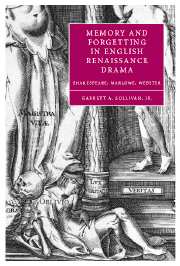Book contents
- Frontmatter
- Contents
- Acknowledgments
- Introduction: planting oblivion
- 1 Embodying oblivion
- 2 “Be this sweet Helen's knell, and now forget her”: forgetting and desire in All's Well That Ends Well
- 3 “If he can remember”: spiritual self-forgetting and Dr. Faustus
- 4 “My oblivion is a very Antony”
- 5 Sleep, conscience and fame in The Duchess of Malfi
- 6 Coda: “Wrought with things forgotten”
- Notes
- Index
- Cambridge Studies in Renaissance Literature and Culture
6 - Coda: “Wrought with things forgotten”
Published online by Cambridge University Press: 09 October 2009
- Frontmatter
- Contents
- Acknowledgments
- Introduction: planting oblivion
- 1 Embodying oblivion
- 2 “Be this sweet Helen's knell, and now forget her”: forgetting and desire in All's Well That Ends Well
- 3 “If he can remember”: spiritual self-forgetting and Dr. Faustus
- 4 “My oblivion is a very Antony”
- 5 Sleep, conscience and fame in The Duchess of Malfi
- 6 Coda: “Wrought with things forgotten”
- Notes
- Index
- Cambridge Studies in Renaissance Literature and Culture
Summary
The promise of an historical event is always more than what was actually realised. There is more in the past than what happened. And so we have to find the future of the past, the unfulfilled potential of the past.
Not long after the witches have informed him that he will one day become king, Macbeth meditates upon his prophesied future and what might be necessary for him to bring that future into being. The thought that he could be required to become a regicide “[S]hakes so [his] single state of man, / That function is smother'd in surmise, / And nothing is, but what is not.” Shortly after considering that his coronation might occur without his taking any murderous action (“If Chance will have me King, why, Chance may crown me / Without my stir” [1. 3. 144–145]), Macbeth is interrupted in his musings, and he quickly apologizes for his preoccupation:
Give me your favour: my dull brain was wrought
With things forgotten. Kind gentlemen, your pains
Are register'd where every day I turn
The leaf to read them.
(150–153)In the second half of this statement, Macbeth pledges that he will always remember the services performed for him by Angus, Rosse and Banquo; the register described here is the book of his memory, and Macbeth claims that he will daily turn its pages. However, he first tells us that he has been dwelling upon “things forgotten.”
- Type
- Chapter
- Information
- Memory and Forgetting in English Renaissance DramaShakespeare, Marlowe, Webster, pp. 132 - 136Publisher: Cambridge University PressPrint publication year: 2005

